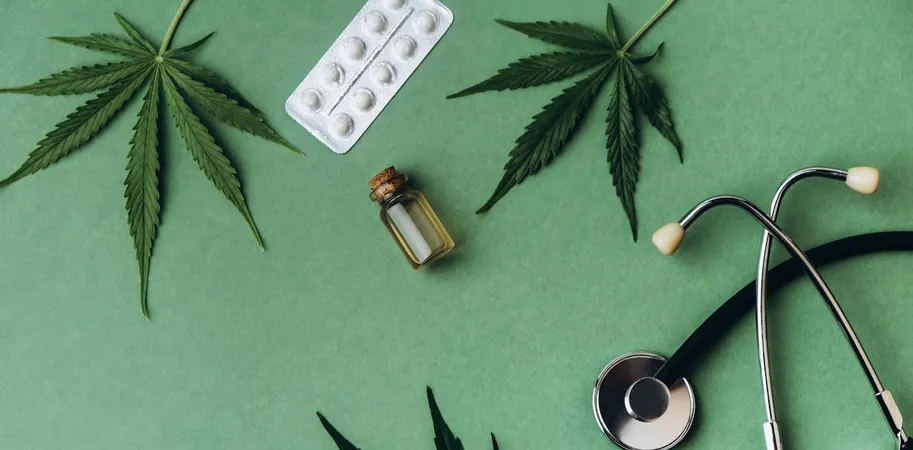
The Surprising Impact of Legalized Marijuana: Fewer Americans Turning to Anti-Anxiety Meds!
2025-01-10
Author: Amelia
The Shift in Mental Health Treatment
Recent research has unveiled a striking trend: as more Americans gain access to legalized marijuana for both medical and recreational purposes, a notable decline in the use of anti-anxiety medications has been observed. This key finding emerges from a study published in the prestigious journal JAMA Network Open, shedding light on the evolving landscape of mental health treatment in the U.S.
Study Insights
The study, conducted by a team of applied policy researchers, focused on how marijuana laws and the opening of cannabis dispensaries influence the prescribing behavior of doctors, particularly regarding anti-anxiety medications. These medications include popular drugs like benzodiazepines (e.g., Valium, Xanax, Ativan) and antidepressants, which are often used to treat conditions like anxiety and depression.
Reduction in Benzodiazepine Prescriptions
Importantly, the research indicates that in states where marijuana is legal, there is a significant reduction in the number of patients filling prescriptions for benzodiazepines. This decline raises important questions about the potential benefits of marijuana as an alternative therapy for anxiety, particularly given the alarming statistics: in 2021, nearly 23% of adults in the U.S. reported a diagnosable mental health disorder, yet only about 65% received treatment.
Implications of Easier Access to Marijuana
Why does this shift matter? The findings suggest that easier access to marijuana may provide a safer and more effective alternative for patients struggling with mental health issues. With certain state laws permitting the use of medical cannabis for mental health conditions such as PTSD, many individuals are discovering a route to relief that does not involve the risks associated with traditional medications, particularly when it comes to benzodiazepines, which can lead to dependence and dangerous side effects.
Broader Impact on Healthcare
Furthermore, these insights carry significant implications for healthcare providers, insurance companies, and policymakers alike. The dangerous intersection of benzodiazepine use and opioid addiction remains a pressing concern, especially as statistics indicate that benzodiazepines were involved in about 14% of total opioid overdose deaths in 2020. By highlighting marijuana as a potential substitute, this study opens the door to safer treatment options for those at risk.
Questions and Further Research
However, questions linger. While the reduction in benzodiazepine use is a promising sign, the research does not yet clarify if these changes in prescriptions translate into improved patient outcomes. There remains a pressing need for further investigation into whether marijuana can effectively replace anti-anxiety medications without sacrificing efficacy.
Considering the Whole Picture
Interestingly, the study also found a slight uptick—albeit less significant—in the dispensing of antipsychotics and antidepressants in some areas. The exact reasons for this increase are not yet clear, but it raises important considerations about the broader impact of recreational marijuana access on mental health across various states.
Conclusion
In conclusion, as more states adopt marijuana legalization initiatives, the implications of these changes on mental health treatment are profound. This evolving landscape continues to reveal the complexities surrounding medication use, public health, and the quest for safer and more effective treatments. Will marijuana prove to be the game-changer that revolutionizes how we approach mental health in America? Only time and further research will tell!



 Brasil (PT)
Brasil (PT)
 Canada (EN)
Canada (EN)
 Chile (ES)
Chile (ES)
 Česko (CS)
Česko (CS)
 대한민국 (KO)
대한민국 (KO)
 España (ES)
España (ES)
 France (FR)
France (FR)
 Hong Kong (EN)
Hong Kong (EN)
 Italia (IT)
Italia (IT)
 日本 (JA)
日本 (JA)
 Magyarország (HU)
Magyarország (HU)
 Norge (NO)
Norge (NO)
 Polska (PL)
Polska (PL)
 Schweiz (DE)
Schweiz (DE)
 Singapore (EN)
Singapore (EN)
 Sverige (SV)
Sverige (SV)
 Suomi (FI)
Suomi (FI)
 Türkiye (TR)
Türkiye (TR)
 الإمارات العربية المتحدة (AR)
الإمارات العربية المتحدة (AR)